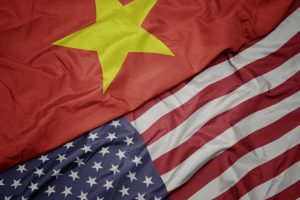Daniel Kritenbrink, the U.S. assistant secretary of state for East Asian and Pacific Affairs, touched down today in Hanoi on an official visit, hot on the heels of Russian President Vladimir Putin, who departed the country last night.
It has been rumored for several days that Kritenbrink was bound for Vietnam, a trip that was confirmed by a State Department spokesperson yesterday. In a statement, the spokesperson said that Kritenbrink “will meet with senior Vietnam government officials to underscore the strong U.S. commitment to implementing the U.S.-Vietnam Comprehensive Strategic Partnership and to working with Vietnam in support of a free and open Indo-Pacific region.”
The statement added that Kritenbrink, who served as U.S. ambassador to Vietnam during 2017-2021, “will also reaffirm the United States’ support for a strong, independent, resilient, and prosperous Vietnam,” and “discuss shared objectives” for the upcoming meetings of Association of Southeast Asian Nations (ASEAN) foreign ministers, which will take place in Vientiane next month.
So far, so routine. But the timing of Kritenbrink’s visit, just one day after Putin’s departure, is certainly notable. During his controversial two-day visit, his first to Vietnam since 2017, the Russian leader signed at least a dozen deals with Vietnamese President To Lam and offered to supply fossil fuels, including natural gas, to Vietnam. The Associated Press reported that the two sides also “agreed to further cooperate in education, science and technology, oil and gas exploration, and clean energy.”
More significant was what the visit communicated in itself. Russia used Putin’s trip to highlight the limited success of the U.S. attempts to isolate Russia and turn Putin into a global pariah over his invasion of Ukraine in February 2022. For Vietnam, the visit was also useful in signaling that it intends to maintain a delicate balance of relations between contending superpowers – a commitment with implications for its relations with the United States.
Putin’s visit came nine months after a state visit by U.S. President Joe Biden, when the two nations announced the establishment of a Comprehensive Strategic Partnership, elevating Washington to the diplomatic tier occupied by Russia, China, and four other foreign partners. While this was viewed in some quarters as a big win for the U.S. in its competition for regional influence with China, the Russian leader’s state visit reaffirms that for Hanoi, the upgrade did not alter the country’s omnidirectional foreign policy, which seeks friendship with all significant foreign powers, while avoiding direct alignment with any of them.
The U.S. is clearly not happy with Putin’s visit. In a statement earlier this week, the U.S. Embassy in Hanoi criticized Vietnam for hosting the Russian leader, just days after the Ukraine peace summit in Switzerland, stating that “no country should give Putin a platform to promote his war of aggression and otherwise allow him to normalize his atrocities.” If Putin is allowed to travel freely it “could normalize Russia’s blatant violations of international law,” the statement added.
Given the timing, it would be surprising if the talks between Kritenbrink and his hosts did not touch on Putin’s visit and Vietnam’s position on the Ukraine war. Whether this does anything to shift Hanoi’s perspective on these questions, however, remains unlikely.

































